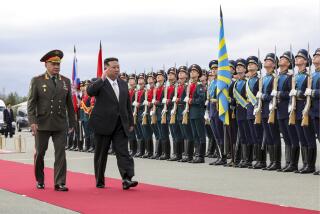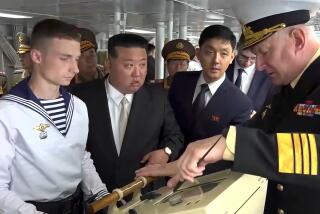North’s Kim Sets South Guessing With China Trip
- Share via
SEOUL — He’s been sighted at a theater, an auto plant, a semiconductor factory, even the visitors gallery of the Shanghai Stock Exchange. And every elusive detail of North Korean leader Kim Jong Il’s surprise visit to China this week is fueling speculation in Seoul.
“Well, he’s known for being a movie maniac, so I wouldn’t be surprised if he heads for a theater while he’s there,” said K. S. Lee, 48, a shipping executive.
Others, such as Kim Ae Jin, a 26-year-old trading company employee, doubt that the reclusive leader will be overly impressed by Shanghai’s bright lights and glitzy shopping centers, even though his last known visit to the Chinese commercial hub was in 1983. “Pyongyang may be dark and gloomy,” she said, speaking of the North’s capital, “but not where he lives.”
At a more fundamental level, many here see the trip as a good sign for North-South relations on the Korean peninsula. No matter what is on his agenda, the fact that Kim Jong Il is making his second official trip abroad in eight months after years of isolation signals that further integration with the world beyond the reclusive North’s well-guarded borders remains a priority.
As is customary, the trip has been shrouded in secrecy. China didn’t announce his visit and isn’t likely to do so until after the “Dear Leader,” as he is known in the North, returns home. But experts say the trip is significant on several counts. Big moves or changes by North Korea have generally been prefaced by consultations with China, its fellow communist neighbor and ally, raising the prospect that Kim is ready to make another symbolic or substantive move toward more open relations with South Korea.
Many also believe that Kim is receiving something of a strongman tutorial on how to open North Korea just enough to keep its crippled economy from collapsing without going so far that he jeopardizes his power base.
China has been practicing a similar balancing act for decades and is in a position to advise Kim on tactics such as how best to use the nation’s police and security forces to curtail individual rights, and how to fight off nettlesome human rights criticism while attracting foreign capital.
South Korea estimates that the North Korean economy grew by 6.2% in 1999 after nine years of decline. The growth came mostly from foreign aid, however, and per capita annual income, at $714, is less than two-thirds the 1990 level.
“China is not necessarily a model, but it provides some very useful lessons,” said Lee Jong Suk, a North Korea expert and senior fellow at Seoul’s Sejong Institute. “He’s gone to have a look around.”
Another reason Kim may want to confer with his Chinese counterparts is to share thoughts on approaching the incoming administration of President-elect George W. Bush, particularly given its stated goal of building an antimissile shield that North Korea and China strongly oppose.
North Korea watchers here also have been analyzing the shadowy world of diplomatic signs, feints and dodges. Analysts say that by making this trip, Kim signals to Washington that he can move closer to China if the new U.S. administration isn’t as interested in moving ahead as the Clinton administration has been.
Although China is North Korea’s strongest ally and arguably its best role model for economic liberalization, Beijing’s experience is not entirely applicable, analysts say.
Leaders in the far bigger China have been able to open limited parts of the Chinese economy--initially allowing greater freedom in coastal regions, for instance--with some assurance that they could reverse course if their power was threatened. Because North Korea is so much smaller, it has far less leeway.
“If North Korea opens some part or changes the economic structure, the outside influence is much harder to control,” said Yoo Ho Yeol, an assistant professor at Korea University here. “Kim Jong Il understands that very well.”
Norbert Vollertsen, a physician with the international aid organization German Emergency Doctors, who left North Korea last week after 18 months in Pyongyang, said he also believes that this trip is aimed at cementing business ties between China and North Korea in advance of any further opening to South Korea or the West.
Kim also apparently hopes to shed his reputation as head of a rogue state as a step toward collecting more foreign aid and financing from agencies such as the World Bank.
“He wants to improve his image and be seen as an open, reform-minded leader in the West, especially in the U.S.,” said Kim Sung Chull, senior researcher with the government-affiliated Korea Institute for National Unification. “In reality, he’s interested in opening more but not so interested in reform.”
More to Read
Sign up for Essential California
The most important California stories and recommendations in your inbox every morning.
You may occasionally receive promotional content from the Los Angeles Times.













